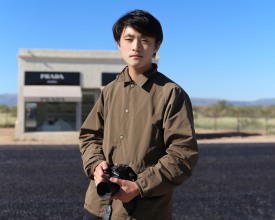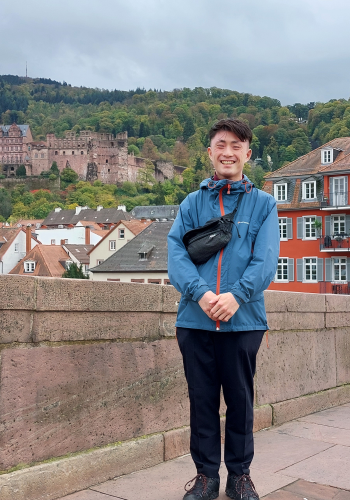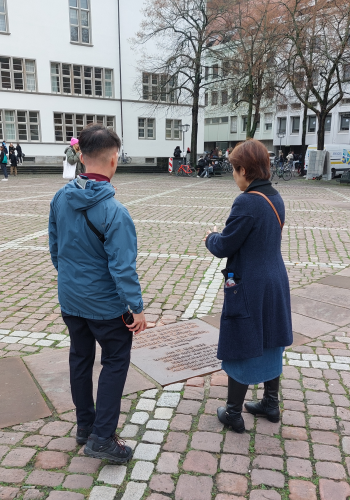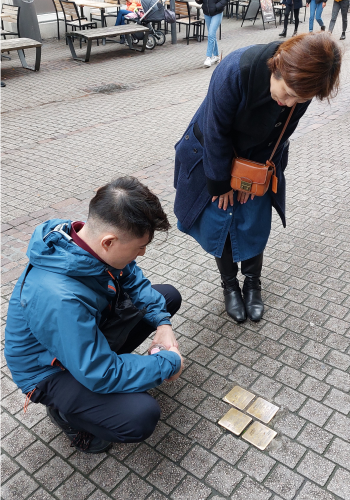|
It’s the cloudy morning of an unusual warm day at the beginning of November 2022. We await Kyoto University architecture student Narihara Takanori – one of the first Kyoto University students staying in Europe to study just shortly after travel restrictions were lifted. In an interview, we asked him about his motivation, his way from the idea to actually going abroad as well as his experiences in Germany. Later that day, we had a little walk through the streets of Heidelberg’s Old Town and talked about historical memory in the public sphere. Narihara Takanori is in his final year of his Ph.D. when he decided to study abroad. Asked for his motivation to study in Germany he said he had many, but named three in particular. |
 |
Firstly, his Ph.D. advisor at Kyoto University had an collaborator at RWTH Aachen and so he could profit from the existing networks. Secondly, his field of research is public spaces and while doing his Ph.D. the IBA project in the Ruhr Region caught his attention. The third reason is his love for German movies – especially the pictures of Wim Wenders, who grew up in this region and produced his first films here. Therefore, Mr. Narihara decided to take the opportunity to get data and inspiration for his research.
Narihara Takanori is in his final year of his Ph.D. when he decided to study abroad. Asked for his motivation to study in Germany he said he had many, but named three in particular. Firstly, his Ph.D. advisor at Kyoto University had an collaborator at RWTH Aachen and so he could profit from the existing networks. Secondly, his field of research is public spaces and while doing his Ph.D. the IBA project in the Ruhr Region caught his attention. The third reason is his love for German movies – especially the pictures of Wim Wenders, who grew up in this region and produced his first films here. Therefore, Mr. Narihara decided to take the opportunity to get data and inspiration for his research.
|
At first, Mr. Narihara had doubts, if he would eligible for a scholarship, and didn’t know where to start. But with the help of his supervisor, the staff at Kyoto University and our office, he did manage. Through Kyoto University European Center connection was made to the International Office at RWTH Aachen. He also received support for the application for RWTH Aachen’s AROP (Advanced Research Opportunities Program) scholarship program, which he received while doing his research. While being in Germany, he was able to visit most of sites of the IBA Emscher Park, which was a large-scale project from 1989 to 1999 to transform the German “rust belt” with its abandoned mines and steel mills into lush recreation areas while also preserving some of the industrial facilities as memorial sites. He was amazed by the connection of the various sites to the surrounding cities by well-designed public transport system. He also became aware of the opportunities these places present to its visitors to “linger”, which according to him is an important function of a place. On a networking level he could also meet architects and project managers since his advisor at RWTH Aachen was involved in this project. |
But his experience went deeper. Having stayed in the USA for a short trip, Mr. Narihara was familiar with traveling overseas. However, living in a country contrary to traveling as a tourist, is different and left a deep impression. In his view, it is important to be aware of the difference, for it opened a change in perspective which led to new experiences and insights into his field of work. What surprised him for example were the “Stolpersteine” – bronze cobbles created by the artist Gunter Demnig commemorating the Nazi terror in the pavement at former homes of the victims. All of this changed his views on tourism in his hometown Kyoto and the relationship between humans, their natural as well as artificial surroundings and the layers of meaning they have. Another thing he cherished was the academic freedom and friendship he experienced at RWTH Aachen, being free to study with no assignments and welcomed by fellow students into their work and free time. He stressed repeatedly that staying in Germany benefited his academic work and personal development and that he was thankful he was for this opportunity.





